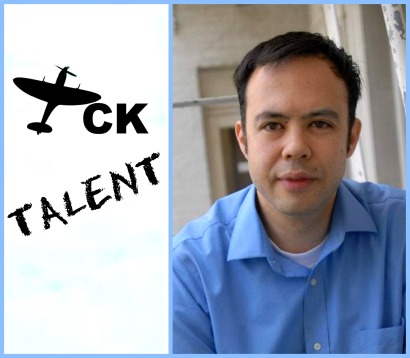
Tracey Warr is here with fellow displaced Brit Charles Lambert, a master writer of literary thrillers. He was born in England, lives in Italy, and describes himself as deeply enjoying the status of being a foreigner.
Greetings, Displaced Nationers.
My guest this month is the writer Charles Lambert, who was born in Lichfield, UK, a cathedral city in the Midlands, but who has lived in Italy for most of his adult life. After graduating from Cambridge, Charles worked as an EFL teacher in Milan and Turin in the mid-1970s—one of the most tumultuous periods in post-war Italian history, which he has written about in his psychological thriller, The View from the Tower.
After two years, he moved to Setúbal, Portugal, a smallish town south of Lisbon—and found himself, once again, at the heart of a political situation he struggled to understand (see his novella, The Slave House). After six months and a disastrous love affair, he returned to the UK to “get a proper job.” He ended up working as an assistant editor at a medical publisher’s on Euston Road.
Fifteen months later, desperately unhappy, he turned down a promotion and headed back to Italy, where he has lived ever since—initially in Modena (northern Italy) and then in Fondi, about halfway between Rome and Naples.
As I’ve already indicated, all of these backings and forthings have provided rich fodder for Charles’s imagination. Even his current work, as a language teacher in Italian universities, a job he has done since 1982, “makes up in the endless variety of human contact what it lacks, signally, in career opportunities,” as he puts it. Charles has also worked as a journalist for the news agency ANSA, translated for academic presses in the UK and the USA, edited for international agencies, and written critical essays on, among other things, George R. R. Martin’s epic fantasy series, A Song of Ice and Fire, in which he confesses a unashamedly nerdish interest.
But his true passion is fiction writing—in particular, the psychological literary thriller. In addition to his many blog posts, the afore-mentioned novella, The Slave House, the occasional poem, and his acclaimed short story collection, The Scent of Cinnamon (for which he won an O. Henry prize), he has written four novels:
- The Children’s Home (Scribner, 2016): An inversion of a modern fairytale, the story centers on a disfigured recluse living on his family estate, with a housekeeper as his only companion. His solitude is disrupted when stray children start showing up on his doorstep.
- The View from the Tower (Penguin Random House, 2013): A psychological thriller and second in a planned trilogy about the darker side of Rome, the story centers on Helen, who has been having an affair with her husband’s best friend, Giacomo, an ex-terrorist, for 30 years. She is in a hotel room in Rome with Giacomo when she receives the news that her husband, a high-level politician, has been murdered. She simultaneously becomes a suspect and suspicious of everyone around her—forcing her to examine her own past and peel back the years of secrets and lies.
- Any Human Face (Picador, 2011): The first in a planned trilogy about the seamier side of Rome, the story concerns what happens when Andrew, a quirky gay bookstore owner and sometime art/antiquity dealer in Rome, stumbles into a political vipers’ nest involving high-level politicians and Vatican officials while also struggling to overcome heartbreak from his past and learning to love again. When the book first came out, the Guardian called it a “sophisticated literary thriller set on the seamier fringe of Rome’s gay scene, a magnet for the lonely and displaced located a long way off the tourist trail.”
- Little Monsters (Picador, 2008): Lambert’s début novel and the first of his books set in modern Italy, this is the story of Carol, a young teenager who, having witnessed her father killing her mother, is put into the care of her aunt, who hates and resents her, and her uncle, whom she eventually marries. The story is told in two time frames: Carol as ward and Carol as an adult, when she finds herself drawn to a boat-refugee child in Italy (the child reminds her of her unwanted teenaged self).

He also recently produced a fictionalized memoir, With a Zero at Its Heart, capturing moments from his life in a unique, experimental format.
Charles says he has no plans to return to the UK, and Brexit is unlikely to persuade him to change his mind:
I don’t define myself as an expat. If I had to define myself, I’d probably go for “economic migrant” or, more simply, “foreigner”, a status I deeply enjoy.
For entirely pragmatic reasons, he is currently in the process of becoming an Italian citizen.
And now let’s hear from Charles about what techniques she uses to conjure up the Italy he knows so well as a long-time resident while also cherishing his status of outsider.
* * *
Welcome, Charles, to Location, Locution. Which tends to come first when you get an idea for a new book: story or location?
Every book is different. My first novel, Little Monsters, began with a sentence and, within seconds, the sentence had found a home in the Peak District, where I spent most of my adolescence. That place, and my memories of it, dictated much of the narrative. The other half of the book was set in contemporary Italy, where I live, although the story took me to a part of Italy I didn’t know that well and I had to use my imagination. So, one novel, half story-led, half place-led. The next two novels I published were both set in Rome, and I can’t imagine them being set in any other city. Rome’s a city with a uniquely composted history of beauty and blood-letting, high ideals and dirty low-down dealings, and the novels dig into that humus with relish. My most recent novel, on the other hand, The Children’s Home, is set in an undefined place and time and the lack of temporal and geographical definition is an integral part of the story.
What is your technique for evoking the atmosphere of these places?
When I’m writing I have a strong sense of where I am. It’s in my mind’s eye, so to speak, so all I need to do is look around and report on what I see. If the place is a real place, then memory is involved. If it isn’t, the details come as I need them. A shop, a street, a tree… As a general rule, though, I’d say less is more. It’s what I call the “Bakelite-ashtray fallacy”—the idea that obsessively name-checking historical materials and brands gives a sense of period. It doesn’t. It gives a sense of working too hard to create a sense of period, and is inevitably counter-productive. The same is true with a sense of place. Too much description draws attention to itself and to the writer’s eagerness to be believed, not to the place it’s supposed to be describing.
Which particular features create a sense of location? Landscape, culture, food?
All three, to a greater or lesser degree, and I’d add language to the list—but, as I said above, with parsimony. It can be hard to resist the temptation to describe in detail every dish your characters are eating—especially if you love food as much as I do and the scene is set in Italy, as scenes in my work often are—but if the purpose of the scene is, well, non-gastronomic, you just need to do your best to keep the detail pared down. My agent, with exemplary dedication, once counted the number of bottles of red wine consumed in one of my novels (Any Human Face, if you’re curious). It was frighteningly high but, we both agreed, integral to the narrative, although it may have contributed to creating, for my characters at least, a serious sense of dislocation!

More seriously, I think descriptions of place need to serve a double purpose. They provide a location, but that location must also give the reader something else, something about the characters’ relationship with that place, for example, or about the way the place might have shaped the characters, who they are, what they think, why they behave the way they do. Without that, it’s window dressing.
Can you give a brief example from your writing that illustrates place?
From Any Human Face (Picador, 2010):
Thirty years ago, Andrew lived just round the corner from Campo de’Fiori, in a two-room garret above the latteria. The latteria still sells its large white bowls of caffelatte and rusk-like biscuits, but Andrew moved on when the intensifying effect of a picturesque tiled roof on winter cold and summer heat became too much for him. Since then, like some bobbing object impelled by a centrifugal force he can neither understand nor halt, he has lived in a series of rented flats, each one a half-mile further from the centre than the one before. By an equally mysterious process, his worldly goods have accumulated as their worth has diminished; each time he moves, the boxes and plastic sacks into which he has stuffed his life seem more forbidding, more intractable. He shuttles between the old flat and the new in whichever car he has borrowed, just one step above a bag lady pushing an overloaded supermarket trolley, front wheel askew, his whole world teetering on a metaphorical wonky castor. He used to think corridors were wasted space. He doesn’t think that now.

In general, how well do you think you need to know a place before using it as a setting?
Intimately, fairly well, hardly at all. Once again, in other words, it depends. In the passage above, I’m describing a part of Rome I lived in for many years. I had breakfast in that latteria, I ate those biscuits, I sweated and shivered in the kind of garret Andrew lived in. In another novel, on the other hand, long sections are set in a town I spent four days in some years ago and have never revisited. I’m hoping no one will notice. I need to have “felt” the place in some way but that doesn’t necessarily require years of research (although Google Street View can come in handy) or lived, physical presence. Sometimes, a single word might be enough to evoke what’s needed. One of the most potent descriptions of place for me comes at the beginning of Kafka’s The Metamorphosis: “His room, a proper human room although a little too small…”, where the two words “proper” and “human” are enough to mark out the extraordinariness of what’s occurred. His room becomes our room, and yet not our room.
Which writers do you admire for the way they use location?
In their very different ways, Cormac McCarthy and Penelope Fitzgerald. In works like the Border Trilogy, McCarthy’s vision of the world and of the lives of its inhabitants (both human and animal) make up a single vision: harsh, numinous, both indifferent and interwoven, a wonder of observation and lyricism. The settings in Fitzgerald’s last four novels range from 1950s Italy to pre-revolutionary Moscow, and there isn’t a moment when the world of the novel isn’t entirely believable. Once again, the trick is to reduce the detail to a bare—and convincing—minimum. There’s a moment in Innocence where children go to Upim (an Italian Woolworth’s) before school starts to buy their exercise books. I don’t know how Fitzgerald knew this, but it was all that was needed to persuade me of the authenticity of the novel’s world.

Charles Lambert’s picks for novelists who have mastered the art of writing about place
Thanks so much, Charles, for your answers. It’s been a great pleasure.
* * *
Readers, any questions for Charles? Please leave them in the comments below.
Meanwhile, if you would like to discover more about Charles Lambert and his body of work, I suggest you visit his author site. You can also follow him on Twitter.
À bientôt! Till next time…
* * *
Thank you so much, Tracey and Charles! I found this discussion fascinating. —ML Awanohara
Tracey Warr is an English writer living mostly in France. She has published two medieval novels with Impress Books. She just now published, in English and French, a future fiction novella, Meanda, set on a watery exoplanet, as an Amazon Kindle ebook. Her new historical novel, Conquest: Daughter of the Last King, set in 12th century Wales and England, will be published by Impress Books in October.
STAY TUNED for next week’s fab posts!
If you enjoyed this post, we invite you to register for The Displaced Dispatch, a round up of weekly posts from The Displaced Nation, with weekly updates and much, much more. Register for The Displaced Dispatch by clicking here!
Related posts:
Photo credits: Top visual: The World Book (1920), by Eric Fischer via Flickr (CC BY 2.0); “Writing? Yeah.” by Caleb Roenigk via Flickr (CC BY 2.0); author photo, photo of Setúbal graffiti and of Italian cafe scene were supplied by Charles Lambert; A view of Lichfield Cathedral from the north West, by Roger Robinson via Wikimedia (CC BY-SA 3.0). Visuals that accompany the two quotations: Empty wine bottles via Pixabay; Roof Tiles (Rome), by Stewart Butterfield via Flickr (CC BY 2.0).




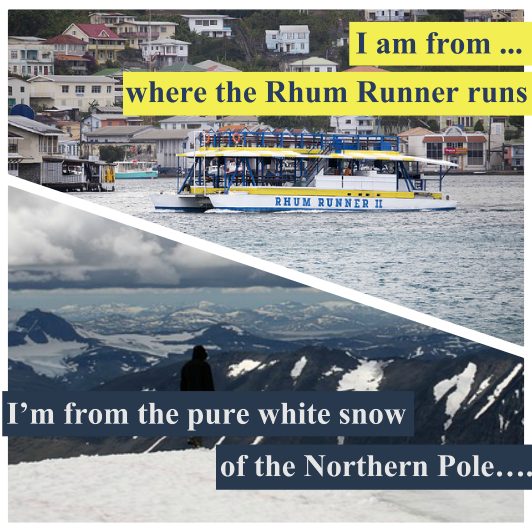
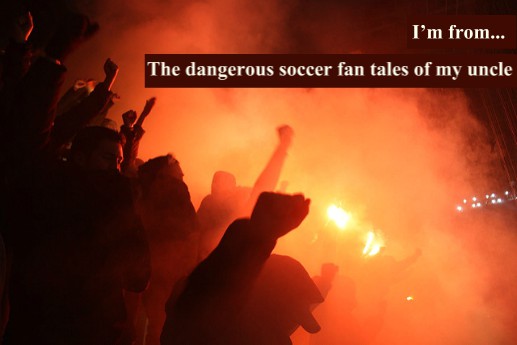
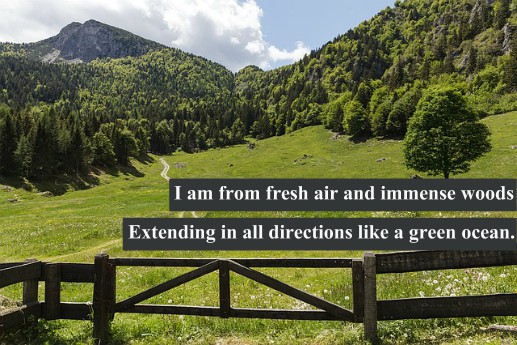






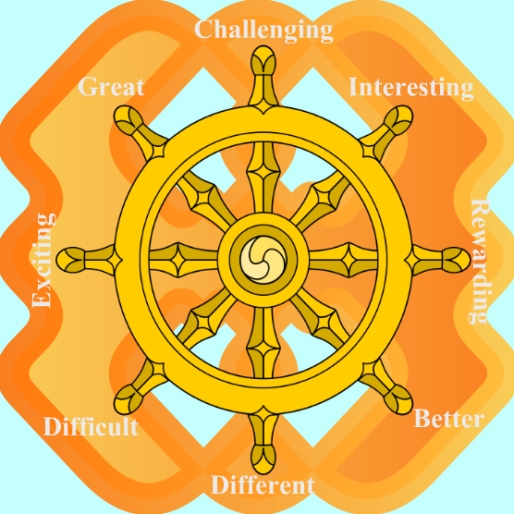
 With both hands, take it, this piece
With both hands, take it, this piece The doors slide open as you pass, the doors
The doors slide open as you pass, the doors Ordinary is overrated. But you carry a secret
Ordinary is overrated. But you carry a secret You never saw it coming—the pothole, cobble,
You never saw it coming—the pothole, cobble, Who wants to be just whelmed? Who wants
Who wants to be just whelmed? Who wants If it were easy, we would all be doing it—
If it were easy, we would all be doing it— The stairs have flattened, the step
The stairs have flattened, the step Not this dust, but a different dust
Not this dust, but a different dust











